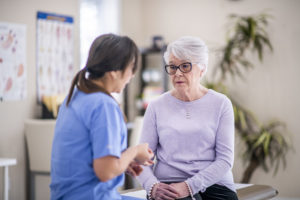 For years, the American College of Surgeons has recommended that elderly patients undergo a geriatric assessment prior to total joint replacement, but many orthopaedic departments in the United States have been slow to adopt the practice.
For years, the American College of Surgeons has recommended that elderly patients undergo a geriatric assessment prior to total joint replacement, but many orthopaedic departments in the United States have been slow to adopt the practice.
“Many elderly patients need an extra layer of support to withstand surgery. A geriatric assessment identifies interventions that can help avoid complications and improve outcomes during total joint replacement,” says Houman Javedan, MD, a geriatrician and Clinical Director for the Division of Aging at Brigham and Women’s Hospital.
Seeking to address this need, the Department of Orthopaedic Surgery at the Brigham recently launched a pioneering geriatric co-management program for elderly patients who are undergoing total joint replacement surgery.
Since launching, about 300 elderly patients who underwent elective total joint replacement have participated in the program. Initial results show that patients who are co-managed by their orthopaedic surgeon and a geriatrician have improved outcomes, lower complication rates and are significantly more satisfied with their surgery.
“A comprehensive geriatric assessment from Dr. Javedan and other geriatricians lets orthopaedic surgeons know the level of care an older patient may need to improve their surgical outcomes and avoid problems,” says Antonia Chen, MD, MBA, a joint replacement orthopaedic surgeon at the Brigham.
Prior to elective replacement surgery at the Brigham, elderly patients receive a questionnaire-based frailty screen. Patients with a high frail score then receive the Comprehensive Geriatric Assessment Based Frailty Index (CGA-FI), a standardized, evidence-based tool for stratifying older adults according to their level of vulnerability.
Administered by Dr. Javedan, the CGA-FI includes the following assessments:
- A comprehensive medical and social history
- Cognitive and functional evaluations
- A battery of physical tests to measure grip and gluteus strength, gait and walking ability, sit-to-stand and balance
- Conversation about goals of care
Patients who score high on the CGA-FI then receive a tailored program that involves perioperative management interventions. An especially frail patient with several comorbidities may require pre-operative interventions, such as pre-habilitation, extra nursing support, and/or changes to medications. The report also helps anesthesiologists make management decisions.
“Orthopaedic surgeons and medical teams use the geriatric assessment to understand how well our patients may recover after surgery,” says Dr. Chen. “Knowing their strengths and vulnerabilities, we can deliver the appropriate level of care and monitoring around surgery.”
If appropriate, the orthopeadic and geriatric team will continue to co-manage patients in the hospital at the time of replacement surgery.
“From the patient’s perspective, geriatric co-management helps create a non-eventful surgery. If we do our job right, patients visit us, have their operation and go home without any problems,” says Dr. Javedan.
Since previous studies have demonstrated poor outcomes in geriatric patients who undergo total joint replacement surgery, Dr. Chen and her colleagues recently launched a study to track post-surgical functional abilities following geriatric co-management.
“Our study compares functional assessments six months after surgery to baseline functional abilities to understand if total joint replacement following geriatric co-management improves outcomes in the elderly,” says Dr. Chen.
Meanwhile, the practice of geriatric co-management at Brigham and Women’s has spread from orthopaedic trauma and elective joint surgery to shoulder and ankle surgeries. Today, spine surgeons, plastic surgeons and even neurosurgeons are requesting geriatric assessments for their elderly patients.
“Our geriatric co-management program gives patients more touch points along the surgical pathway. It also gives patients more education and preparation. Patients know what to expect before and after their surgery, and they relish the opportunity to discuss age-specific concerns with a geriatric expert,” says Dr. Chen.